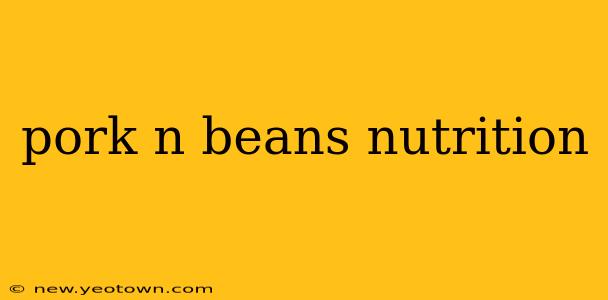Let's be honest, pork and beans conjure up images of cozy evenings, hearty meals, and perhaps even a childhood favorite. But beyond the comforting nostalgia, what's the real nutritional story behind this classic dish? It's more complex than you might think, offering a surprising mix of benefits and considerations. This in-depth look will explore the nutritional profile of pork and beans, addressing common questions and concerns.
What are the nutritional benefits of pork and beans?
Pork and beans are a surprisingly good source of several essential nutrients. The beans themselves pack a powerful punch of fiber, protein, and various vitamins and minerals. The addition of pork contributes extra protein and iron, further boosting the nutritional value. Specifically, you'll find significant amounts of:
- Protein: Essential for building and repairing tissues, supporting immune function, and creating enzymes and hormones. Both beans and pork contribute significantly to your daily protein needs.
- Fiber: Crucial for digestive health, helping to regulate bowel movements and promoting a feeling of fullness. Beans are particularly high in fiber, which can aid in weight management and reduce the risk of chronic diseases.
- Iron: Important for carrying oxygen throughout the body. The pork in pork and beans is a good source of heme iron, which is more readily absorbed than non-heme iron found in plant-based foods.
- B Vitamins: Essential for energy production, nerve function, and cell metabolism. Beans are a good source of several B vitamins, including thiamin, riboflavin, and folate.
Are pork and beans high in sodium?
This is a crucial question, and the answer is often, yes. Many canned pork and beans are quite high in sodium due to the preservation process and added seasonings. The high sodium content is a significant consideration for individuals with high blood pressure or those watching their sodium intake. However, it's important to note that you can mitigate this by choosing low-sodium varieties or preparing your pork and beans from scratch, allowing you to control the sodium levels.
How many calories are in a can of pork and beans?
The calorie count in a can of pork and beans varies depending on the brand, serving size, and ingredients. Generally, a standard serving (around 1 cup) can range from 200 to 300 calories. However, this can increase significantly if you add extra ingredients like bacon or sausage. Calorie awareness is especially important for individuals managing their weight.
What are the potential health risks of eating pork and beans?
While generally healthy, some health risks are associated with excessive consumption of pork and beans. As mentioned, the high sodium content is a primary concern. Additionally, some individuals may experience digestive discomfort due to the high fiber content, especially if they are not accustomed to consuming a high-fiber diet. It's always wise to introduce high-fiber foods gradually to allow your digestive system to adapt.
Are pork and beans good for weight loss?
Pork and beans can be part of a weight-loss diet, particularly due to their high fiber and protein content. Fiber promotes satiety, keeping you feeling full for longer, and protein helps maintain muscle mass during weight loss. However, portion control and mindful selection of low-sodium varieties are crucial to ensure that the nutritional benefits outweigh the potential drawbacks related to sodium and calories.
What are some healthy ways to prepare pork and beans?
To maximize the nutritional benefits and minimize potential health risks, consider these healthy preparation methods:
- Choose low-sodium options: Look for canned beans with reduced sodium or prepare your own from scratch.
- Add vegetables: Boost the nutritional profile and fiber content by adding vegetables like onions, peppers, or carrots.
- Control portion sizes: Be mindful of your serving size to manage calorie and sodium intake.
- Make your own: Making pork and beans from scratch gives you complete control over ingredients and sodium levels.
In conclusion, pork and beans offer a compelling nutritional profile, providing essential vitamins, minerals, and fiber. However, awareness of the high sodium content is crucial, and choosing low-sodium options or preparing your own from scratch is highly recommended to maximize the benefits and minimize potential health risks. Remember, moderation and mindful eating are key to enjoying this classic comfort food as part of a balanced diet.

